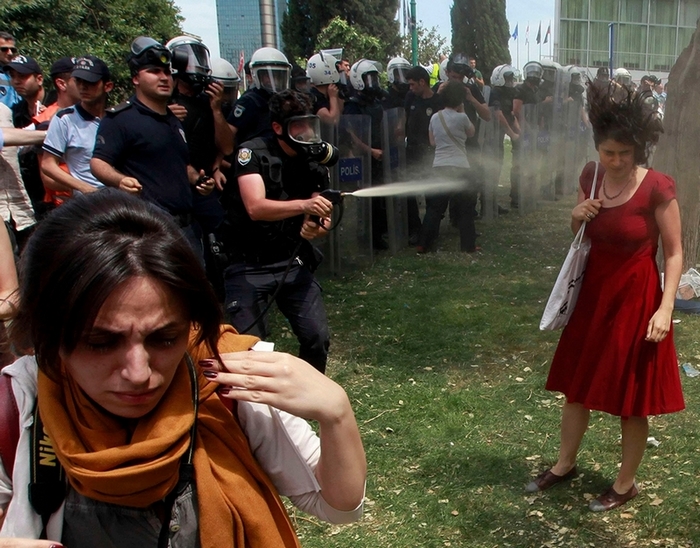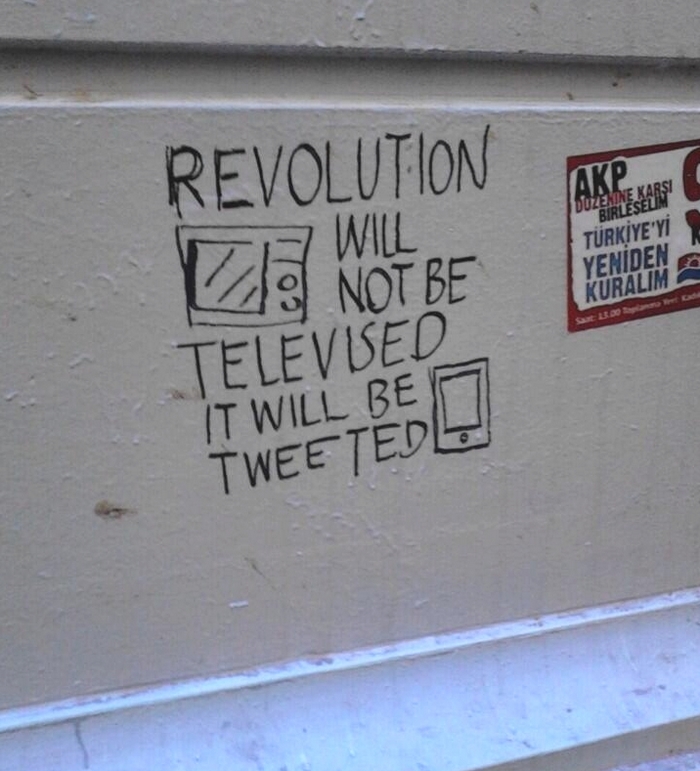
Mr. Erdogan gets and earful -- global communication
Mr. Erdogan gets an earful, as the saying goes.
It has been in all the major news media: in The New York Times, in The Washington Post, in BBC world news, in theguardian, in USA Today. Only the most local of news media have missed the revolt going on in Turkey.
The story goes like this. At the beginning of the week, May 28, 2013, a small and peaceful group began a protest against converting a park in Istanbul into a shopping center and imitation relic of the past. They camped out, ate, drank, sang, and otherwise let it be known that they did not like the plans.
That was too much for the authorities so the police were dispatched, leading with tear gas, pepper spray and batons. The beatings and the spraying raised the stakes. The photo that came to symbolize the relationship between police and protestors was the Istanbul equivalent of the spraying of students on the UC Davis campus.
 |
Standing, not exaclty minding her own business, and the police lashed out -- right in the face. It was a strong enough spray to blow her hair back. That produced a fight, as it often does. On the first, the second, the third, and for longer tens of thousands descended on the park and congregated in various locations all over the country. The police violence moved what was a minor protest into a challenge to the status of Mr. Erdogan. Erdogan must go became the theme.
This is a preliminary report about the internet explosion that was happening at the same time as the explosion on the ground. Mr. Erdagon had heard more than he wanted and was quoted as saying
In his remarks, Mr. Erdogan criticized Twitter, which became an important conduit of news — and unfounded rumors — about the demonstrations, which were not covered aggressively in the Turkish news media.
“Now we have a menace that is called Twitter,” he said. “The best examples of lies can be found there. To me, social media is the worst menace to society.” (New York Times, 6/2/2013)
Apparently, he had heard more than enough if "worst menace to society" was his view of Twitter.
This report is a look at the people who were blasting the Twitter 'waves' with messages that Mr. Erdagon found so offensive.
An aside about the data: I began collecting twitter messages that mentioned either #gezipark, gezi park, or Erdagon. There were other hashtags for which I might have searched, but my primary interest is in twitter messages mentioning Erdagon. The search used the Twitter streaming API which yields an unspecified sample of the total stream. Between approximately 17:00 on June 1, Turkish time, through 6:00 on June 3 I collected just over 550,000 tweets. It is a big collection but is only a sample of the total. This report will be about the persons who were producing those tweets.
Just over 300,000 users produced the 550,000 tweets in the collection. There was a bit of 'piling on' in response to the furor. Twitter tells when an account was opened. Between January 1, 2013 and May 27 the average number of new accounts per day among the people tweeting was 206. The number of new accounts for people tweeting from May 28 through June 2 was
May 28 |
May 29 |
May 30 |
May 31 |
June 1 |
June 2 |
291 |
316 |
383 |
889 |
2913 |
1842 |
There are more new accounts in those days than earlier in the year, and on June 1 it was a minor explosion. However, most are veterans of Twitter communication. They joined in the years
2006 |
2007 |
2008 |
2009 |
2010 |
2011 |
2012 |
2013 |
32 |
768 |
2662 |
36059 |
57804 |
85637 |
80284 |
37204 |
2006 is the beginning for Twitter, and there are 32 veterans from the very beginning. The explosion rocketing Twitter into the popular culture is present in the leap in new accounts from 2008 to 2009. Almost 90% of the people tweeting June 1 and June 2 had had accounts earlier than 2013.
The new accounts, May 28-June 2, were very busy on Twitter. They averaged 40 tweets after their account was established. But that does not seem unusual since the average number of tweets per user, over the existence of their account, is 3864 for all 300,000. These are active Twitter communicators.
Communication infra-structure is now global. Twitter, Facebook, and other social media are, more or less, available globally to anyone who has access to the internet. There are governments that inhibit the use of the internet by their citizens, and there are continents on which internet access is difficult. With those caveats, communication is potentially global.
Is a global infra-structure producing a global public domain? Are people from all over the world piling on to Mr. Erdagon or is the communication limited to people from Turkey?
To answer that question one needs geography. And geography has to be handled very carefully when studying messages posted to Twitter. There are two problems with the information Twitter provides: 1) completeness, and 2) error. Twitter provides three bits of location information about every account. The one that is most accurate but least complete is longitude and latitude. If you know the longitude and latitude of the message you can be confident about the accuracy of geography. Unfortunately, on average only abour 3% of twitter messages are accompanied by longitude and latitude data. Users have to turn it on, and 97% do not. For the 550,000 I collected the percentage was just under 1.5%. Second, users can supply a location for their profile page. The profile page is the information about the user that is publicly available. Availability is greater than 3%. Fifty-three percent of the 300,000 users provided this location information. Unfortunately, it suffers from a higher error rate. For many users location is a game. "Ho ho, I am from . . ." That is probably not a great percentage, but it is there. Third, Twitter provides the time zones of users. This is information available on the user setting page, which is available only to the person with the password or people getting information via a Twitter API. For the 300,000 the location information is available for 77%, which is about average. Availability is higher. There is little reason to play games with this location information since only the user is going to see it. But error is present at an unknown rate. Time zones are big chunks of geography. It appears that Twitter uses 141 time zones, which are not the bands reaching from the south pole to the north pole. There is a time zone for Arizona, which seems rather odd. But if you are willing to work with big chunks of geography rather something as local as a city or longitude-latitude this has the least problem of completeness. And it is what I will use.
How many of the user accounts are located in Twitter's Istanbul, where Istanbul is the label of the time zone for the entire country? The number is 65,673, which is 22% of the total. This is a very big number for Turkey's participation in a global communication stream. For example, the day of the 2012 U.S. presidential election I collected tweets containing Mr. Obama's name posted by almost 900,000 users. The information on time zone was available for 74% of them. Of those with time zone information 45% were from time zones outside the U.S. And 3,348 were from Istanbul. One more example of Turkish participation in the global public domain. January 19, 2013 through January 25 I collected 338,818 twitter messages referring to Syria. It was a 'hot time' in the conflict that has engulfed Syria for two and one-half years. The messages were posted by 76,935 accounts, and 49,106 or 64% had time zone information. Only 506 of the accounts with time zone information were from Istanbul. The point is 65,673 is a very big number relative to the numbers in other instances of global communication.
Europe, the United States and Canada were the time zones of 65,890 accounts. There were 39,124 for South America and 34,624 for the Middle East. The regions of Africa, Asia, Australia, and the Pacific accounted for only 4,552 of the users.
Very early there was a report that 90% of the geocoded tweets were from Turkey. I do not doubt that, but only, at most, 3% of the tweets are likely to have been geocoded. In my count it was smaller than that. Examining the time zones of the users posting messages to Twitter is a more reliable method to assess the global mix of messages and gives a different message.
What about the question? What may we learn about an emerging global public domain from this early examination of the Twitter stream about the revolt in Turkey? One, police violence in Turkey provoked a huge outpouring of messages on Twitter. A sample of 550,000 in a day and a half is a deluge by almost any standard of political communication. Two, the stream of messages was produced by a mix of local, Turks, and global, 'busybodies' from the rest of the world. Turkey has a thriving internet community, but the population size does not reach that of the rest of the world. Hence, the rest of the world dominates the stream. Three, we learn that we can begin to address the question in a systematic fashion. I mentioned the research about location of people mentioning Mr. Obama during the late days of the 2012 election. (Boynton, 11/13/2012) I also have three reports on the political protests when Mr. Morsi seemed to set himself above the law in November and December of 2012. (Boynton, 11/25/2012, 12/13/2012, and 12/15/2012) This is the beginning of a research focus to better understand how and when political communication goes global.
As for Mr. Erdogan this photo seems apt.
 |
References
Arsu, Sebnem (6/2/2012) Turkish Leader Says Protests Will Not Stop Plans for Part, The New York Times
G. R. Boynton (12/15/2012) The highpoint of global communication as Egyptians struggle, http://www.boyntons.us/website/new-media/analyses/global-communication/morsi-egypt/report-02to11/report-egypt-02to11.html
G. R. Boynton (12/13/2012) Morsi and global communication November 23 to December 2 http://www.boyntons.us/website/new-media/analyses/global-communication/morsi-egypt/morsi-first-nine-days.html
G. R. Boynton (11/25/2012) What? A new dictator in Egypt? http://www.boyntons.us/website/new-media/analyses/global-communication/morsi-egypt/morsi-first-two-days.html
G. R. Boynton (11/13/2012) It's a global shoutout Mr. President http://www.boyntons.us/website/new-media/analyses/users-baseline/global-shoutout.html
© G. R. Boynton June 5, 2013